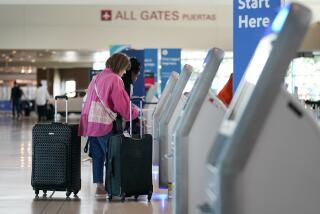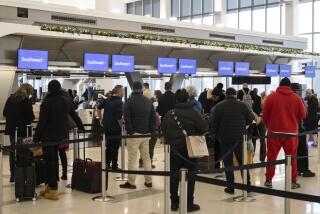Attach Some Strings to That Airline Aid
- Share via
Sept. 11 is having a ripple effect on our economy and our national psyche that will be evident for years to come. The Bush administration’s methodical and deliberate approach to fighting terrorism should help stabilize our financial system. But in our haste to assist the most recognizable economic victims, we must not forget that there are many others who also are suffering greatly as a result of the terrorist attacks.
No domestic airline was immune from the loss of revenue resulting from the practical and necessary grounding of all domestic flights Sept. 11 and reductions in flight schedules and broad airline layoffs that followed.
Congress quickly passed the Air Transportation Safety and System Stabilization Act, which will provide $15 billion to fund the continuing operations of U.S. carriers, with the expectation that this would avoid further job loss and get the country flying again.
To give this money to the airlines with no strings attached, however, would be a mistake.
Taxpayers deserve assurances that their money is being spent wisely and is contributing to the recovery of the U.S. economy.
If this doesn’t happen, thousands of travel-and tourism-related small businesses--including hotels, restaurants, car rental companies and travel agents--may find it even harder to stay afloat. And none of them stands to receive bailout funds or loan guarantees.
Because it was passed in haste, the new law lacks requirements that the airlines use this money only for continuing their core operations. We should insist on this. We should insist as well that there be financial assistance to laid-off airline industry workers. And we should insist on better training for airport security personnel.
The Office of Management and Budget has issued regulations for the air carrier loan guarantee program. These broad and hastily prepared rules do not contain specific limitations on the carriers’ activities while they are federally subsidized.
As long as they’re getting taxpayer money, the airlines should be prohibited from investing in non-core business ventures unless they provide compelling justification to the overseeing agency created by the law.
Do taxpayers want to help United enter the lucrative business of executive jet time-shares? Or help airlines expand their investment in businesses such as online travel agencies? I don’t think Congress intended that.
The new law is designed to ensure that Americans can continue to safely travel for business and pleasure--not for airlines to diversify while laying off their own workers, threatening the jobs of thousands of hotel and restaurant workers and causing small-business owners such as travel agents to lose their shirts.
More to Read
Inside the business of entertainment
The Wide Shot brings you news, analysis and insights on everything from streaming wars to production — and what it all means for the future.
You may occasionally receive promotional content from the Los Angeles Times.










